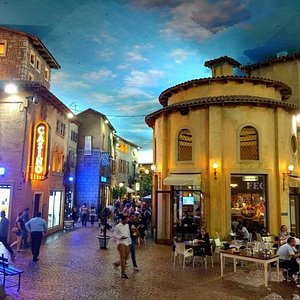More About Johannesburg North Attractions
More About Johannesburg North Attractions
Blog Article
Johannesburg North Attractions Fundamentals Explained
Table of ContentsThe Ultimate Guide To Johannesburg North AttractionsSee This Report on Johannesburg North AttractionsJohannesburg North Attractions Can Be Fun For AnyoneGetting My Johannesburg North Attractions To WorkGet This Report about Johannesburg North AttractionsJohannesburg North Attractions Things To Know Before You BuyThe Best Strategy To Use For Johannesburg North Attractions
You should keep safety and security in mind and visitors have to remain sharp at all times when in unfamiliar surroundings. Talk to the residents when you remain in community to learn about the area you are remaining in. Johannesburg North attractions. When on the street (this doesn't put on mall and various other safe and secure atmospheres) ideal general recommendations is to try your best to look like a local and to avoid presenting any type of kind of riches
The 10-Minute Rule for Johannesburg North Attractions
Professor Revil Mason O. J. (Thomson, 1946) discovered the Witwatersrand's pre-colonial background. His historical work took off the 'em pty land' myth, according to which the region was devoid of human habitation prior to the arrival of European settlers. In his magazines Prehistory of the Transvaal: A Document of Human Activity (1962) and Origins of Black People of Johannesburg and the Southern Western Central Transvaal Advertisement 3501880 (1986 ), Professor Mason demonstrated the level of social and economic growth in the area before Europeans established foot right here.

All About Johannesburg North Attractions
In 1878, David Wardrop found gold in quartz veins at Zwartkop, north of Krugersdorp. In 1881, Stephanus Minnaar came throughout gold on the ranch Kromdraai, near the Cradle of Mankind.
In March 1886, a protrusion (quickly to be called the Main Coral reef) was located, quite fortuitously, on Gerhardus Oosthuizen's ranch Langlaagte. Some claim that the Lancastrian coal miner George Pedestrian uncovered this reef. Another travelling English miner, George Harrison (that had formerly functioned in Australian mines) acquired a prospecting permit in regard of Langlaagte in Might 1886.
He determined to relocate on in a mission for greener fields, and disposed of his Langlaagte claim for the princely amount of 10. Alas: below lay the richest goldfield ever located. The discovery of this abundant auriferous reef prompted a gold rush that signified completion of bucolic tranquillity in the southerly Transvaal.
It would, within 6 years, become the biggest town in southerly Africa. Within a decade, it would certainly make the Z. A. R. until after that an he said anarchical and bankrupt little state the richest country in Africa. By the millenium, the Z. A. R. was to surpass Russia, Australia and the USA of America to become the globe's leading gold producer, creating more than a quarter of the world's gold.
The Basic Principles Of Johannesburg North Attractions
It was called Ferreira's Camp, named after Colonel Ignatius Ferreira. He was a Boer adventurer upon whom the British authorities had actually presented the status of Companion of the Many Identified Order of St Michael and St George (qualifying him to the post-nominal letters C. M. G.) in appreciation for his function in the battle that had actually deposed the Pedi king Sekhukhune in 1879.
Quickly the camp was bristling with tents and wagons as beginners showed up daily from far and wide. By September 1886, some 400 people resided in Ferreira's Camp, which quickly flaunted upraised iron and wood buildings. 2 other camps were developed: Meyer's Camp on the ranch Doornfontein, and Paarl Camp. The latter was nicknamed Afrikander Camp; many individuals from the Cape Swarm resolved there.

The Single Strategy To Use For Johannesburg North Attractions
This name gained currency by word of mouth, such that the State Assistant attested the name to the Mining Commissioner on 9 October 1886. Stands in the town were auctioned on 8 December 1886. While some stands were cost 10, others were home knocked down for just sixpence.
2 years later, these erven were to change hands for as long as 750 each. The tented camps diminished as a dorp of corrugated iron structures created and expanded north of the mines located along the Key Coral Reef Roadway. linked here Areas such as Jeppe's Town (where working-class immigrants erected their homes) and Doornfontein (where the upscale brand-new 'Randlords' started to create their luxurious residences) were soon contributed to the ever-expanding map of the town.
The 25-Second Trick For Johannesburg North Attractions
Apart from the road names, there were no indicators of Johannesburg being located in a Dutch-speaking country. Several years later, C. W. Kearns O. J. (one of the initial kids signed up at St John's University in 1898) would remember: 'A strange fact regarding Johannesburg was that, although it remained in the [Boer Republic], nearly everyone talked English and even the Government slaves dealt with one in English, unless they were very first addressed in the Taal (or Low Dutch)'.
As such, Britain had a passion in making certain ideal conditions for gold production on the Witwatersrand, and that the gold was exported to London instead of Berlin an imperative made even more clamant by the Z. A. R - Johannesburg North attractions.'s boosting toenadering with Germany. Mine proprietors got on a clash with President Kruger, whose policy of monopolistic giving ins (often provided to his cronies) stopped mining companies from obtaining materials of materials (especially dynamite) and work on their very own, less expensive terms
The Greatest Guide To Johannesburg North Attractions
In 1890, the Volksraad had limited the franchise business to white guys who had actually lived in the Z. A. R. for fourteen years or longer, therefore disqualifying many of the immigrants (that took place to be the significant contributors to the fiscus). Anxiety for the vote was a mere pretext for promoting a various schedule; a lot of uitlanders regarded themselves as short-term visitors and had no purpose of continuing to be in the Z.
Report this page